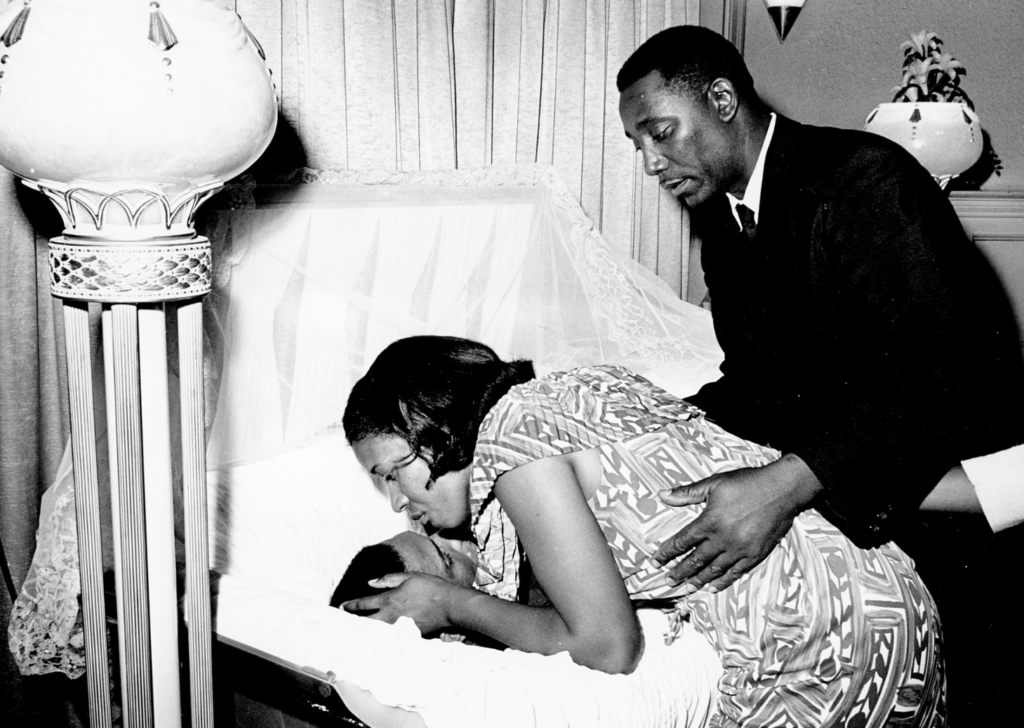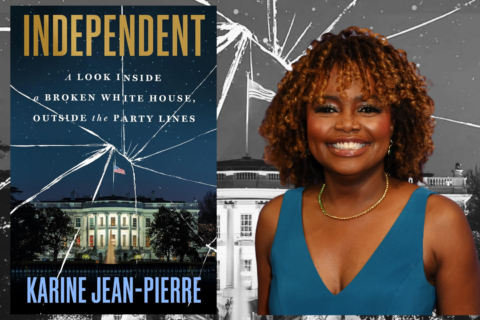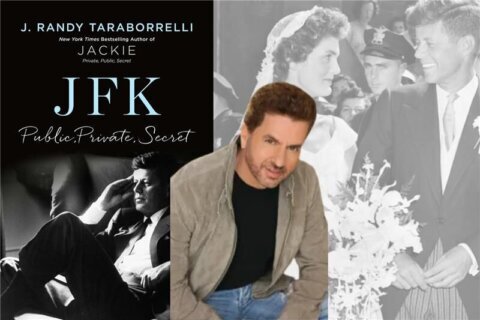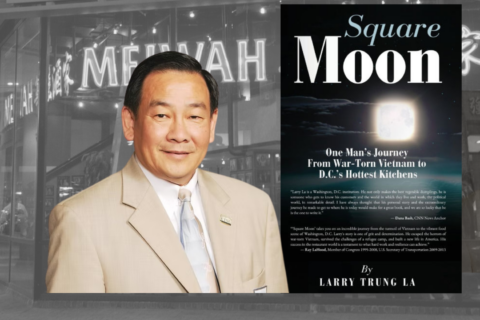This story was written as part of the WTOP Book Report series authored by Terik King. Read more of that coverage.
This video is no longer available.
When Medgar Evers was slain outside his family home on June 12, 1963, he was the first Civil Rights leader of his era to fall to an assassin’s bullet. That left his young wife, Myrlie, to chart an uncertain path forward as the first national Civil Rights widow — preceding such figures as Dr. Betty Shabazz (the wife of Malcolm X, shot dead in 1965) and Coretta Scott King (wife of Dr. Martin Luther King, Jr., killed in 1968).
In a wide-ranging interview with the WTOP Book Report, Joy Reid, host of MSNBC’s “The ReidOut” and bestselling author of New York Times bestseller “Medgar & Myrlie,” brings the deeply personal and historical narrative of Medgar and Myrlie Evers into sharp focus. Reid unveils the layers of this remarkable love story, set against the backdrop of the violent and tumultuous Civil Rights Movement in 1950s-1960s Mississippi.
Reid tells WTOP, the genesis of “Medgar & Myrlie” was the profound personal presence of Myrlie Evers-Williams herself.
Recounting their initial encounter on the set of her MSNBC show in 2018, Reid told WTOP, “She’s such a compelling figure. And if you spend 10 minutes with her, and she starts talking about Medgar … she still exemplifies this sense of being just giddy in love with this man. We just got into this conversation, and that conversation stayed with me for years, literally. It was just such a deep love. And it was still so present for her … I thought, ‘You know what? This would be a joy to write about.’”
Born into the struggle
“Medgar & Myrlie” recounts Medgar Evers’ life from his origin as a boy in segregated Mississippi, a place where “death arrives quickly for Black boys,” Reid writes. He grew up under the guidance of his father James (“Crazy Jim”) Evers, a tough and dignified man who earned his nickname by refusing to be cowed or intimidated by the white supremacist status quo in Mississippi. Young Myrlie Beasley, by contrast, was brought up by her proper and protective grandmother and aunt. She had a somewhat more sheltered early life and had patrician aspirations to become a teacher and musician.
By the time they met as first-year students at Alcorn Agricultural and Mechanical College (a historically Black college, now Alcorn State University), Medgar had already witnessed lynchings of Black men and served on D-Day at Omaha Beach during World War II, only to return home to the U.S. and be beaten himself for not moving to the back of a bus — while dressed in his army uniform.
“That actually set Medgar Evers on this course of really believing that the right to vote was the right to dignity,” said Reid, “the right to live as free men was something he had earned as a veteran, (and) as somebody who had fought for this country.”
Myrlie, for her part, was wary, yet intrigued by the worldly upperclassman who respectfully wooed her.
“She was a feisty sister, and they had a contentious relationship, because … she knew that the things he was doing — trying to convince (Black) people to register to vote — could get him killed. She was not shy about letting him know how she felt,” Reid said.
Reid’s narrative highlights how Myrlie reached a place of unwavering support for Medgar’s activism, despite her fears and reservations about the dangers he faced.
Love, family and the fight for justice
Medgar and Myrlie married in 1951, and three years later Medgar was named the NAACP’s first field secretary for Mississippi. In this position, he helped organize boycotts and set up new local chapters of the NAACP, bringing added visibility and dangers to the family’s life. Myrlie supported her husband by working as his secretary and confidant, but “it increases the tension between them. She was very frank and very blunt about it. And so a lot of the book is talking about this very real relationship that was love, tension, arguments, the whole nine … everything that goes with a real marriage.”
“Medgar & Myrlie” paints a vivid picture of the oppressive racist forces operating in ’50s and ’60s Mississippi: from the KKK, to white Citizens’ Councils formed to track and penalize any Black people attempting to register to vote or join the NAACP, to the Sovereignty Commission, a unique agency formed by the State of Mississippi for the express purpose of spying on its citizens.
“It was like living in the old Soviet Union,” Reid said of that era in Mississippi. “You didn’t know who was spying on you. This was the atmosphere they were living in: constantly being surveilled and spied upon as you were fighting just for the right to vote and send your kids to school.”
A pivotal moment in the story centers around Medgar’s assassination and its immediate aftermath, including Myrlie’s poignant interactions with President John F. Kennedy. Reid underscores the profound impact of Medgar’s death on the trajectory of the Civil Rights Movement, culminating in Kennedy’s shift from inertia to an active commitment to advancing Civil Rights legislation.
“(Kennedy sent) for Myrlie and her children, greets them in the White House, along with Charles Evers (Medgar’s older brother) and he hands Myrlie a copy of the bill,” Reid said. “And he says, ‘I’m going to send this to Congress.’ Then when it takes too long, the March on Washington is a response to (that). So, the connection between Medgar Evers and the Civil Rights Act (of 1964) is direct. It’s literal and direct.”

Myrlie Evers would go on to work for more than three decades to bring Medgar’s murderer to justice, and she also served as national chair of the NAACP’s Board of Directors from 1995-1998. Just last June, the former Evers family home and site of Medgar’s murder, was named a national monument by the National Park Service.
‘Not a trauma piece’
Reid emphasized the need to honor Medgar and Myrlie Evers’ legacies amid ongoing challenges to historical truth and to underscore the importance of understanding the sacrifices made for civil rights. Reid believes in the need to confront and acknowledge the traumatic aspects of Black history while also celebrating the resilience, love and ordinary moments that define these iconic figures.
Addressing a sentiment often echoed by younger people of color — the desire to move beyond narratives of Black trauma — Reid said it’s important to acknowledge the trauma while also highlighting the need to portray the full spectrum of human experiences within these stories.
“Every story about us, unfortunately, when we get pulled out of Africa, is a Black trauma story,” Reid said.
“But I wanted this to also be something else. I wanted it to be a love story as well. Because while these heroic figures in our past did heroic things and often lost their lives for it, in addition to that, they did things like fall in love, have kids, have to make sure the kids had lunchboxes packed, went on dates, danced with their sweetheart to their favorite songs in the living room … and Medgar and Myrlie did all of those things too.”
Reid underscores the significance of capturing the multifaceted nature of their lives, stating: “I wanted to make sure that this man who I think is a legend … his name should be known like Martin and Malcolm … that he was also a human being and an ordinary person and it’s inspiring to me to know what ordinary people can do when they love someone or something enough to act.”
“Medgar & Myrlie” is the result of a meticulous two-year research endeavor that involved extensive archival exploration, interviews with neighbors, friends and family members, and a deep dive into historical records to paint a vivid picture of the horrors — and loves — of America’s past.
Reid’s prose offers a poignant tribute to the indelible contributions of two ordinary individuals who dared to live extraordinary lives — challenging injustice and setting the standard for future generations of activists to come.
Joy Reid will be at Politics and Prose on Monday for an event at 7 p.m. to discuss “Medgar & Myrlie.” The event is free with first come, first served seating.
Get breaking news and daily headlines delivered to your email inbox by signing up here.
© 2024 WTOP. All Rights Reserved. This website is not intended for users located within the European Economic Area.








